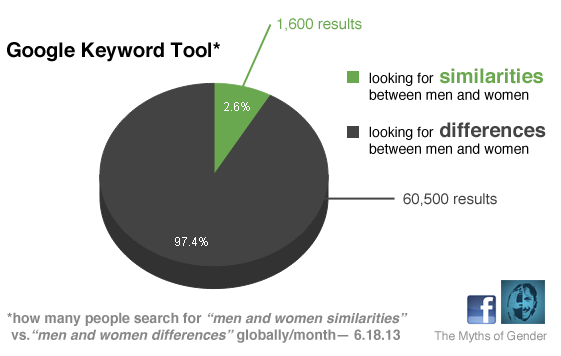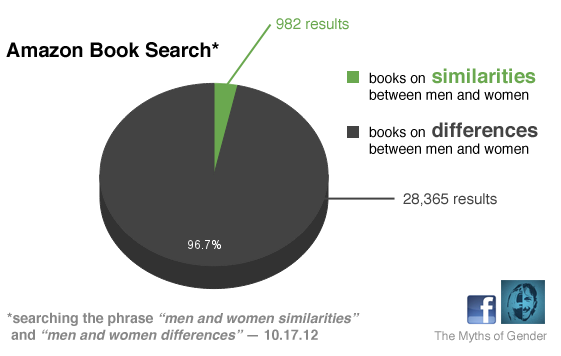I’d like to talk about the myths of gender and how we’re not yet ready to end the war between the sexes.
Joseph Campbell calls myth, “an expression of the human imagination… reflecting the influences of a specific social environment.”
The myths in the case of gender is just that. A set of imagined roles that males, females, and others should play in our society.
Any time you hear someone say, “a ‘real man‘ would ____” or “she’s barely a ‘woman,’ look at her ____” that’s one myth of gender being expressed—i.e. who we believe men and women are supposed to be, simply because they are male or female.
Ready for the kicker?
While our imaginations hold these myths that men and women are so very different, we’ve actually been very keen on proving ourselves right by seeking out those differences.
How do I know?
Here’s an example: Using Google’s Keyword Tool, I looked up the global monthly # of searches for two different phrases. I got 1,600 results for “men and women similarities” and 60,500 results for “men and women differences”…

As for what’s available on the topic, a search on Amazon books for “men and women similarities” offered 982 results. A search for “men and women differences” yielded 28,365 results.

Can you see the similarities in those pie charts?
There’s a huge emphasis on finding differences, n’est pas?
Here’s the ridiculous part, the book titles about “differences” range from describing men as waffles and women as spaghetti (I’m pretty sure these are metaphors), that men are from Mars (the “warrior” planet) and women are from Venus (the “desirable object” planet), and that men don’t listen and women can’t read maps.
Is this not the biggest load of stereotyping bullsh*t you’ve ever heard?
Can you imagine if we were writing books making those kind of comparisons based on racial differences? Like describing Asians as broccoli and Caucasians as rutabaga?
Thankfully, I’m betting such books would not do so well today.
The irony is that focusing on differences is the very thing needed if you want to strengthen stereotypes.
Please, breathe and read that line above one more time…
Studies come out all the time comparing people’s differences. Why aren’t there more studies that show us our similarities? Would that be too boring?
Well actually, it might be.
“Many studies use both male and female participants. The researchers may well check for gender differences, but if none are found, make no mention of it in the published report.”— Cordelia Fine, author of “Delusions of Gender: How Our Minds, Society, and Neurosexism Create Difference” (Norton Books, 2010)
As we continue to be more interested in differences while ignoring similarities, we are committing to strengthening gender stereotypes. These stereotypes allow us to play the gender game, a harmful game that has no end.
When you consider what is possible in human development (i.e. human potential), I believe men and women are not so different—either one could become a kick-ass engineer, or an amazing stay at home parent.
I’m not saying all men and woman are the same. I am saying that comparing a man and a woman is about the same as comparing a man to a man or a woman to a woman—there are so many varieties!
(I haven’t even mentioned transexuals, asexuals or hermaphrodites—and I won’t, though it’s a big part of how ascribing behavior expectations based on biology breaks down very quickly)
The end of gender stereotyping will happen when we see how similar we really are with one another, regardless of our sexual make up. And if we can’t see the current similarities, we’re looking in the wrong places (hint: try moving beyond what’s in between our legs).
I believe in empowerment for men, women, and anyone who doesn’t ascribe to a gender role. I am not interested in demonizing, asking for forgiveness or blaming a dysfunctional culture. I’ve tried all those strategies and they just don’t work that well : )
I believe self responsibility is the doorway. One person at a time, choosing for themselves that they won’t succumb to their own patterns of punishing or rewarding someone else for playing this gender game poorly or well.
You have an option to play this game or not. Here’s what it looks like, so you can sniff it out for yourself.
The Rules of the Gender Game
- There is no “Gender Game”
- Anyone who does not choose a gender role (man or woman) must be punished
- Men must dominate women and other men
- Women must be objects of desire and submit to male dominance
- Anyone following the rules of their gender must be rewarded
- Anyone breaking the rules of their gender must be punished
- These rules must never be altered or questioned
“I’ve come to see the gender system created by this culture as a particularly malevolent and divisive construct, made all the more dangerous by the seeming inability of the culture to question gender, its own creation.”—Kate Bornstein, author of “Gender Outlaw: on Men, Women, and the Rest of Us” (Vintage Books, 1995)
Knowing these rules, I’ve chosen to see what I can start noticing.
In other words, pay attention to how I might punish or reward myself (and others) in this game where expectations abound and ceasefires appear boring.
I’m not saying this practice of noticing and taking responsibility is easy—I am saying it’s important.
And now that you know the Gender Game rules, the practice of catching yourself and choosing not to play along can proceed.
Care to give it a go?
• • • • • • •
[ a version of this article first appeared on elephantjournal ]

0 responses to “Is Ending the War Between the Sexes Too Boring?”